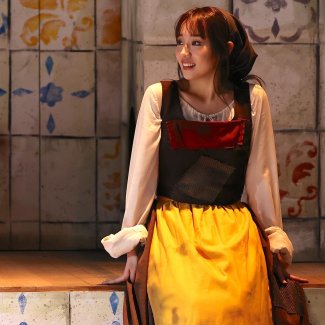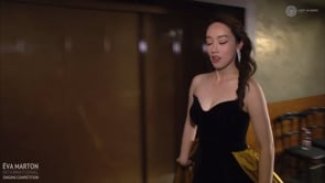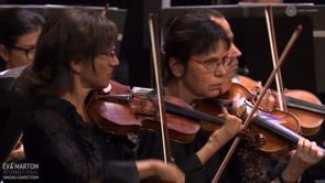




Hongni Wu
Links
Download Assets
“Hongni Wu brought technical agility, warm colourings and an ample sound…she sang with youthful bloom and richness.”
(New York Times)
A former member of Royal Ballet and Opera’s Jette Parker Young Artists Programme, Hongni Wu’s recent returns to Covent Garden as a principal guest brought unqualified success: in the 2022/2023 season as Kuchtik in a new production of Rusalka, conducted by Semyon Bychkov and last season, conducted by Kevin John Edusei, as Suzuki in Madama Butterfly, hailed by The Guardian as “a mezzo of rich mellow dignity”.
As a young artist at Covent Garden, Wu made her main stage debut as Flora in Richard Eyre’s popular production of La traviata under Antonello Manacorda, subsequently appearing as Mercédès in Carmen, Zweite Dame in Die Zauberflöte and Siébel in Gounod’s Faust. At the Linbury Theatre, she was praised for her gritty interpretation of Hans Werner Henze’s Phaedra and as part of the Young Artists’ Summer Showcase she performed scenes from both Pelléas et Mélisande and Il barbiere di Siviglia.
See more
As part of Hongni Wu’s 2024/25 season, she returns to Opéra National de Montpellier as Farnace in Mitridate, re di Ponto, conducted by Philippe Jaroussky, she reprises Siébel in David McVicar’s production of Faust at the Royal Ballet and Opera Covent Garden under Maurizio Benini, and she debuts as Cherubino in Le nozze di Figaro at Santa Fe Opera under Harry Bicket. In concert, Hongni joins Ensemble Resonanz and Riccardo Minasi in a curated programme of Handel and Cherubini at Kölner Philharmonie.
Hongni Wu has recently delighted critics with her Rossini portrayals: as a spirited Angelina in La Ceneretola at Teatro Carlo Felice di Genova under Riccardo Minasi and as Rosina in Il barbiere di Siviglia at both Opera Theater of Saint Louis under Jonathan Brandani and at Macau International Music Festival. She debuted as Dorabella in Così fan Tutte at Pacific Opera Victoria, as Der Komponist in Ariadne auf Naxos at Opéra National de Montpellier and returned to the roles of Kuchtik at Opera Royal de Wallonie under Giampaolo Bisanti, and Suzuki at The Royal Danish Opera under Paolo Carignani. Further important appearances include her creation of the dual roles of Comrade Chin and Shu Fung in the world premiere of Huang Ruo’s M. Butterfly at Santa Fe Opera, and Bao Chai in Bright Sheng’s Dream of the Red Chamber at San Francisco Opera.
Equally comfortable on the concert and recital platforms, recent seasons have seen Mahler’s Symphony No.3 at London’s Royal Festival Hall with Paavo Järvi and Philharmonia Orchestra, Mahler’s Das Lied von der Erde with Yu Long conducting Guangzhou Symphony Orchestra and Tan Dun conducting Shanghai Symphony Orchestra as well as Mahler’s Lieder eines fahrenden Gesellen with Wuhan Philharmonic Orchestra. In Tan Dun’s epic Buddha Passion, Hongni Wu debuted with Accademia Nazionale di Santa Cecilia conducted by the composer himself. Last season, in a programme focused on Brahms, Dvořák and De Falla, Hongni Wu and her pianist Sergey Rybin gave sold-out recitals at Quangzhou Xinghai Concert Hall and Jaguar Shanghai Symphony Hall
Whilst studying at the Manhattan School of Music, Hongni Wu gave performances as Angelina, Sesto in La clemenza di Tito and La libellule in L’enfant et les sortilèges, garnering praise from the New York Times for her “technical agility, warm colourings, and ample sound,” and was a 2018 winner of The Metropolitan Opera National Council Auditions.
Contacts
Shirley Thomson Senior Director, VOICE at HarrisonParrott | Head of CSR
General Management
General Management
Gallery










Hongni Wu with her velvety lower range, captivates with her impeccable Italian phrasing in the recitative, while deeply moving the audience with a genuine sincerity.
Hongni Wu brings a captivating stage presence and a voice rich in nuance to her portrayal of Farnace, perfectly suited to embody the rebellious son.
“As Rosina, the appealing mezzo Hongni Wu was youthful and lively, moving with easy grace and revealing a pearly voice. She handily negotiated Rossini’s ornate lines, showing tasteful restraint in her ornamentation.”
“Hongni Wu dazzles as an assertive Rosina, particularly in the demanding coloratura passages that require precision and agility.”
“Knocking it out of the park is mezzo-soprano Hongni Wu as Rosina. Her luminosity onstage results in some dynamic chemistry with both Stark and Morstein. Throw in her dynamic voice as you have a stellar OTSL debut from a talented performer who will undoubtedly be heard from again.”
“Andrew Morstein as Almaviva and Hongni Wu as Rosina are quite charming, confident young lovers. Both bring beautiful voices and fine comic senses to the roles.”
“Aided in no small part by the superb Suzuki of Hongni Wu, who became the lens through which the whole tragedy is refracted.”
“But best alongside the title role is undoubtedly Hongni Wu’s Suzuki, who brings a mezzo of rich mellow dignity to her important role.”
“Kuchtik is played by the young mezzo-soprano Hongni Wu, whose versatile voice moves easily between high and low tessituras. Expressive in her acting and voice, the kitchen boy is endearing, almost innocent.”
“the delightful young mezzo-soprano Hongni Wu stands out as Kuchtík, the kitchen boy”
“Mezzo-soprano Hongni Wu made for a feisty Cinderella and sang with strength but also sensitivity.”
“As Angelina (Cinderella), Hongni Wu met all the coloratura challenges set by Rossini and sang with an elegance and emotive beauty that transformed even simple phrases into meaningful sentiments. Angelina’s final aria was particularly moving: Wu effortlessly displayed the entirety of her range, moving through explosive rapid-fire passages with silky smoothness.”
“Hongni Wu could have a career singing nothing but Cenerentola. The beautiful Chinese mezzo had everything needed, vocally and every other way, at her disposal; expressive features, a voice with a big bright top, a warm middle voice, and an easy plunge into the lower register. The speed and accuracy of her coloratura was never less than dazzling, even possessing an impeccable old-school trill that thrilled… She quite brought down the house.”
“Compelling young Chinese mezzo Hongni Wu (Dorabella) in her Canadian debut and a bright future in front of her”
“Hongni Wu (Dorabella) is a highly accomplished mezzo-soprano with a keening timbre and enviable technique.”
“Hongni Wu almost upstages everyone with a brilliant turn as the servant Kuchtik.”
“The young mezzo Hongni Wu is a revelation [as Der Komponist]. Between creative exaltation and existential angst, her emotion grips us…the timbre of the voice is fresh, radiant and assured.”
“Hongni Wu embodies the beautiful role of Der Komponist with candour and believable naïveté, leading her to give in to the enchantments of Zerbinetta. Her mezzo voice with a silky lower-register and controlled legato inhabits the role from start to finish.”
“Der Komponist benefiting from the youthful ardour and clear timbre of Hongni Wu.”
“The JPYA singers shone, led by the Chinese mezzo-soprano Hongni Wu as a bird-like, manga-vamp Phaedra”
“Chinese mezzo-soprano Hongni Wu is particularly impressive in the title role, singing this hugely difficult music with great skill and acting the role with great passion.”
“But it was the pairing of Aphrodite and mezzo-soprano Hongni Wu as Phaedra that set the evening ablaze. These young singers had the presence and power of true opera stars and, in diva-esque form, they carried all before them.”
“Wu’s richly coloured voice and excellent phrasing were most impressive in both of her arias, especially ‘Voi che sapete’.”
“Hongni Wu, 23, a mezzo-soprano, brought technical agility, warm colourings and an ample sound to ‘Cruda sorte’, a bel canto showpiece from Rossini’s L’italiana in Algeri. Then, in a bold choice, she sang the opening scene of Strauss’ Der Rosenkavalier with youthful bloom and richness. We’ll have to see if she follows the path of the coloratura-happy Marilyn Horne or the refined, lyrical Susan Graham.”
“Her voice was pure and bright, singing with beauty as she expressed her interest in love over riches…Wu’s voice blossomed into a wide array of colours and emotions. She developed into her character and proved to be a remarkably outstanding voice.”













